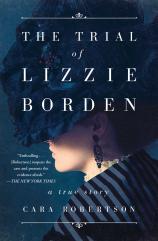The Trial of Lizzie Borden: A True Story
Review
The Trial of Lizzie Borden: A True Story
Cara Robertson ends THE TRIAL OF LIZZIE BORDEN with a researcher’s cri de coeur, and --- after reading the book --- you would have to have a heart of stone not to empathize with her. It turns out that Lizzie Borden’s attorney (a former Massachusetts governor) preserved his file on the case, with his notes and materials and what-have-you, and resides currently at a successor law firm. And said law firm, on the perfectly sound and reasonable grounds of attorney-client privilege, has kept the contents of the file secret, and has decided not to release said contents to earnest young researchers, no matter how nicely they ask.
This is partly because whatever is in those files is new material. The difficulty with writing about the murders of Borden’s father and stepmother is that it is well-trodden ground. The killings happened so far in the past and have been reviewed and re-reviewed so often that there isn’t a new angle from which to approach them. Having the notes from Borden’s attorney (illegible though they may be) would, at minimum, be new information. My guess is that there likely would not be anything truly incriminating in there --- although if there were, it would explain the desire to keep the seal of confidentiality on the contents.
"Robertson is an attorney, and she weaves the dead transcripts into new life, producing a tale nearly as riveting today as it must have been then. But it is the press coverage that gives the tale its verve..."
The likely value of the defense attorney’s files is the light that they shed on the courtroom battle, and given that this battle is the thrust of Robertson’s take on the case, it must have been highly frustrating for her to have been denied access. Robertson takes us through the details of the case in a spare, just-the-facts-ma’am manner, with no room for speculation. She isn’t giving the Borden case the true-crime treatment and doesn’t speculate on the actual outcome outside of disdain over the more outlandish theories, such as the one about Borden committing the murders in the nude. The focus here is solely on the trial, and it’s entirely welcome.
Robertson is working with two primary sources: the transcript and the press coverage. The transcripts (written in shorthand in the days before stenography machines) give us a window into the mechanics of the trial --- the arguments, the witnesses, the cross-examination. Robertson is an attorney, and she weaves the dead transcripts into new life, producing a tale nearly as riveting today as it must have been then. But it is the press coverage that gives the tale its verve --- from the competing (and colorful) personalities of the reporters, to the unlikely little details of the proceedings. (For example, the resident courthouse cow who constantly interrupted the trial with its lowing must have been at least as famous in its time as Kato Kaelin was in his.)
One expectation that the reader might have going in is that the trial itself would not be conducted in a manner consistent with what we would see today. There was an all-white, all-male jury (complete with the luxurious mustaches common to the era), but Massachusetts at the time did seat jurors of color, if not women. Obviously, the Borden trial did not feature high-paid jury consultants or high-tech presentations, as you’d see in a modern trial. And of course, the forensics of the era aren’t comparable to what you’d see today in any way. But most of what Robertson captures is familiar to the contemporary reader --- the surprise exhibits, the chatty witnesses, the struggles over admissible and inadmissible evidence.
THE TRIAL OF LIZZIE BORDEN is only incidentally a true-crime book and, as such, doesn’t have the traditional coda where the author sets forth her version of what might have happened. (She does provide a useful rundown of other people’s takes, including Bill James’ mathematical analysis.) What I think this shows is that a trial --- especially from the criminal defendant’s point of view --- is not an engine for the discovery of truth. We don’t know what happened that morning in Massachusetts, and we likely never will. The prosecution’s argument was, largely, that if Lizzie Borden didn’t do it, who else possibly could have? But the Anglo-American legal process didn’t, and doesn’t, require her to prove her innocence. So it is still unproven, and will remain so, despite the excellence of Robertson’s legal, analytical and narrative skills.
Or at least it will stay that way until they open up the defense lawyer’s file.
Reviewed by Curtis Edmonds on March 22, 2019
The Trial of Lizzie Borden: A True Story
- Publication Date: March 10, 2020
- Genres: History, Nonfiction, True Crime
- Paperback: 400 pages
- Publisher: Simon & Schuster
- ISBN-10: 1501168398
- ISBN-13: 9781501168390




